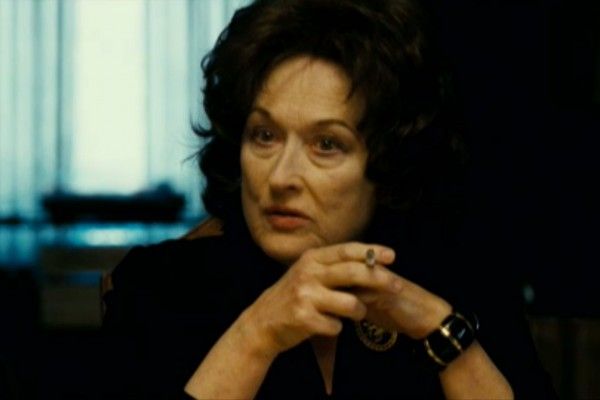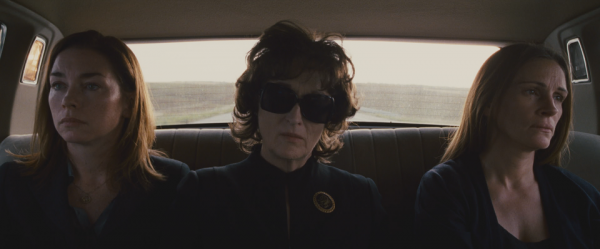It’s tough to decide if August: Osage County is foremost an insightful work about the dark, twisted, occasionally humorous nature of family, or if it’s good platform to showcase big performances. Either way, it’s an engaging picture that features memorable turns from its stellar cast, especially (and unsurprisingly) Meryl Streep, and also throws together a complicated, abrasive portrait of a shattered family that can’t put the pieces back together. They can only break into smaller pieces, and the only thing stopping the audience from breaking down is the black comedy permeating the family affair.
Beverly Weston (Sam Shepard), the patriarch of the Weston family, has died, and his funeral has brought together his estranged family. The pill-popping matriarch Violet (Streep) is joined by her daughters Barbara (Julia Roberts), Karen (Juliette Lewis), and Ivy (Julianne Nicholson); sister Mattie Fae (Margo Martindale), her husband Chris (Chris Cooper), and their son Charles (Benedict Cumberbatch). Also along for the demented ride are Barbara’s daughter Jean (Abigail Breslin), separated husband Bill (Ewan McGregor), and Karen’s fiancée Steve (Dermot Mulroney). The only non-related person on the premises of the Weston house in Oklahoma’s Osage County is the new maid Johnna (Misty Upham) who is presumably relieved that she’s not related to this gang of lunatics. Over the next several days, grievances are aired, secrets are revealed, and the strained relationships become even more complicated.
The Weston clan could be referred to as a powder keg, but a powder keg can only explode once. The reunion is predicated on death and it doesn’t get much better from there when it comes to the prevailing attitude hanging over the characters. Violet is by far the most damaged as she’s not only lost her husband, with whom she already had a tenuous relationship, but she’s a drug addict, cancer-stricken, and is mean down to her bones. Her children have hardly any love for her, her sister berates Charles, Chris tries to play peacemaker, and on it goes. There are, at most, two healthy relationships in August: Osage County. The rest are predicated on grudges, deceit, and manipulation. Separately, each of these groups had their problems, but bringing them together only highlights their issues and then exacerbates them.
Adapted from the Pulitzer Prize-winning play by Tracy Letts (who also wrote the screenplay), August: Osage County edges dangerously close to a melodrama with how far it takes the characters’ lives from bad to worse. Some reveals are absolutely unnecessary, and only exist to further show how family relations could be construed as inherently and inescapably damaging. The Westons aren’t meant to represent all families but instead provide an amalgam of issues that some families could face. At the very least, they provide an utterly captivating freak show.
The deeply flawed characters are an actor’s paradise, and the cast runs absolutely wild with Streep at the forefront. The only way Streep could truly surprise audiences at this point is if she gave a bad performance. Violet is despicable, but Streep taps into the wry, funny, sad, venomous, manipulative facets of the character. We can see how Violet’s ugliness could drive people away and yet her perceived weakness can guilt her children into staying close. Streep doesn’t have anything to prove, but August: Osage County is further evidence that she’s one of the greatest screen actors of all-time.
The rest of the cast does an admirable job of keeping up and finding their place in the script even though Violet is the juiciest role. Barbara is a co-lead, but doesn’t really get to carve out a role until the second-half of the movie. Once there, Roberts’ performance really takes off as we see a woman who is against her mother but also disturbingly similar to her. However, until this point, Roberts’ performance consists mostly of giving Violet plenty of hardened glares. At least when Barbara is finally unleashed, her wrath is worth the wait. All of the other actors get their moments, but the main event is Violet vs. Barbara.
The large performances and outsized conflict is tempered by the dark comedy laced throughout the story. Without the humor, August: Osage County would still feature interesting characters and worthwhile subtext, but the ugliness would be too much to bear. The jokes are where the audience can come up for air, and Letts’ script deftly weaves laughs into even the darkest, most serious scenes. A typical scene can feature hilarious, quotable one-liners and an absolutely devastating reveal.
This emphasis on giving the movie over to the actors isn’t just by virtue of having a great cast, but is also the natural extension of having a stage play as the source material. Director John Wells makes sure the movie never feels stagey even though its stage origins are always on display. Most of the film is comprised of long scenes that take place in a single location. The trick for Wells is managing the details like how long to hold a shot on an actor, if he should keep the camera on the speaker or go for a reaction shot, and where to place the camera. This sounds relatively simple, but trying to move around multiple characters in a single location is incredibly complex, especially when it comes to the film’s centerpiece—a dinner scene following Beverly’s funeral. The direction may not be flashy, but it’s pragmatic and lets the characters and themes come through.
The difficulties the Weston clan faces shows how family trauma is like a virus that spreads not only across generations but across all family ties. At one point, Ivy questions the very nature of family, and how we’re forced together with these people not by choice but by birth, and that they’re allowed to have so much of an impact on our lives. Of course, with the cavalcade of difficulties permeating the Weston family, that impact is greatly amplified to an overwhelming degree.
August: Osage County is a big movie filled with big emotions from big characters played with big performances. Subtlety is not the film’s strong suit, but the performances make the characters come alive in such a way that you feel some sympathy for each of the Weston family members even if the character has far more than their fair share of personal shortcomings. And while difficult emotions bubble beneath the surface of the story, and later explode into chaos, we can leave the movie with a smile on our faces not only because of the dark comedy, but because as dysfunctional as our families might be, at least we’re not as bad as these nutjobs.
Rating: B
For all of our TIFF 2013 coverage, click here. Here are links to all of my TIFF 2013 reviews:




